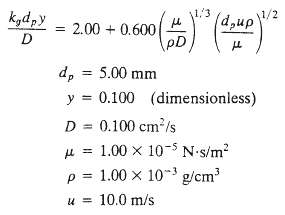The following empirical equation correlates the values of variables in a system in which solid particles are
Question:
The following empirical equation correlates the values of variables in a system in which solid particles are suspended in a flowing gas:
Both (?/pD) and (dpup/?) are dimensionless groups; kg is a coefficient that expresses the rate at which a particular species transfers from the gas to the solid particles; and the coefficients 2.00 and 0.600 are dimensionless constants obtained by fitting experimental data covering a wide range of values of the equation variables. The value of kg is needed to design a catalytic reactor. Since this coefficient is difficult to determine directly, values of the other variables are measured or estimated and kg is calculated from the given correlation. The variable values are as follows:
(a) What is the estimated value of kg? (Given its value and units)
(b) Why might the true value of kg in the reactor be significantly different from the value estimated in part (a)? (Give several possible reasons)
(c) Create a spreadsheet in which up to five sets of values of the given variables (dp through u) are entered in columns and the corresponding values of kg are calculated. Test your program using the following variable sets; (i) the values given above; (ii) as above, only double the particle diameter dp (making it 10.00mm); (iii) as above, only double the diffusivity D; (iv) as above, only double the viscosity ?; (v) as above, only double the velocity u. Report all five calculated values of kg.

Step by Step Answer:

Elementary Principles of Chemical Processes
ISBN: 978-0471720638
3rd Edition
Authors: Richard M. Felder, Ronald W. Rousseau





